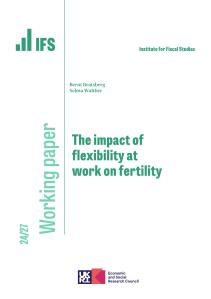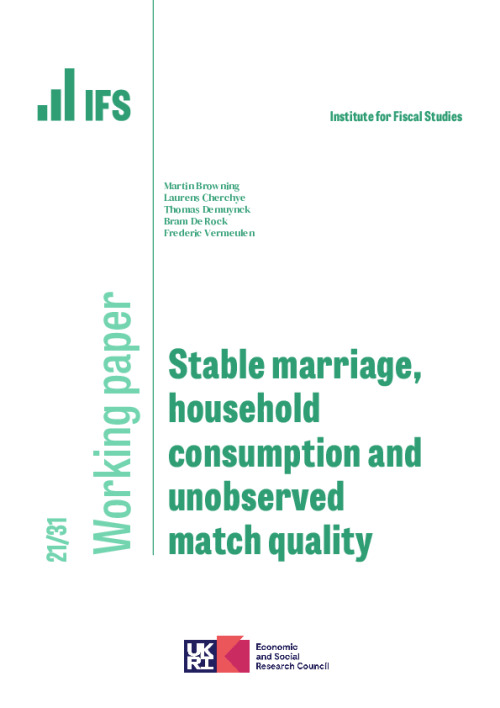Downloads
We present a methodology for the structural empirical analysis of household consumption and time use behaviour under marital stability. Our approach is of the revealed preference type and non-parametric, meaning that it does not require a prior functional specification of individual utilities. Without making use of the transferable utility assumption, but still allowing for monetary transfers, our method can identify individuals’ unobserved match qualities and quantify them in money metric terms. We can include both preference factors, affecting individuals’ preferences over private and public goods, and match quality factors, driving differences in unobserved match quality. We demonstrate the practical usefulness of our methodology through an application to the Belgian MEqIn data. Our results reveal intuitive patterns of unobserved match quality that allow us to rationalise both the observed matches and the within-household allocations of time and money.
Authors

Research Associate University of Copenhagen
Martin is an IFS Research Associate, a Nuffield Senior Research Fellow and a Professor of Economics at the University of Oxford.

Research Associate Katholieke Universiteit Leuven
Laurens is a Research Associate of the IFS and a Professor in the Department of Economics, KU Leuven.

Research Associate Université libre de Bruxelles
Bram is a Research Associate of the IFS, a Professor of Economics at ULB and a Professor of Mathematics and Statistics at KU Leuven.

Research Associate University of Leuven
Frederic is a Research Associate of the IFS, a Professor of Economics at the University of Leuven and a Research Fellow at the CEPR.

Thomas Demuynck
Working Paper details
- DOI
- 10.1920/wp.ifs.2021.3121
- Publisher
- Institute for Fiscal Studies
Suggested citation
Browning, M et al. (2021). Stable marriage, household consumption and unobserved match quality. London: Institute for Fiscal Studies. Available at: https://ifs.org.uk/publications/stable-marriage-household-consumption-and-unobserved-match-quality (accessed: 30 June 2024).
More from IFS
Understand this issue

Gender inequalities in work and pay explained
20 March 2022

How did parents’ experiences in the labour market shape children’s social and emotional development during the pandemic?
1 August 2023

Gender norms, violence and adolescent girls’ trajectories: Evidence from India
24 October 2022
Policy analysis

Making mortgage guarantees permanent will help some first-time buyers, but only if they can afford a bigger mortgage
6 June 2024

Conservatives' plan for child benefit withdrawal goes some way to fixing a bizarre system - but misses an opportunity for a more fundamental reshape
6 June 2024

What you need to know about the new childcare entitlements
28 March 2024
Academic research

The intergenerational elasticity of earnings: Exploring the mechanisms
3 June 2024

The impact of labour demand shocks when occupational labour supplies are heterogeneous
28 June 2024

The impact of flexibility at work on fertility
11 June 2024
